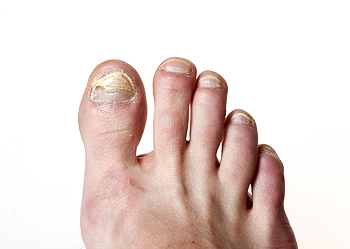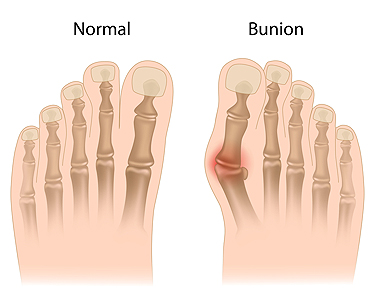Items filtered by date: January 2022
Why Are My Toenails Yellow?
A common cause for yellow toenails is toenail fungus, however, it may be indicative of other conditions such as diabetes, psoriasis, yellow nail syndrome, lymphedema, lung problems, or jaundice. Fungal nail infections may also present symptoms such as thickened, hardened, and brittle nails, and the nail may even lift from the nail bed and emit a foul odor. Wearing shoes may cause pain or discomfort as well. This infection of the toenail (onychomycosis) is typically caused by the dermatophytes fungi in temperate climates, or non-dermatophytic moulds or candida in more tropical environments. Fungal nail infections may be brought on by exposure to the fungi that is living in public areas which are damp and warm such as communal showers, locker rooms, pools and gyms. Ill-fitting footwear, excessive sweating of the feet, brittle nails due to age, as well as injury, psoriasis, or other skin conditions may also increase a person’s risk for developing a fungal nail infection. Treating fungal nail infections is best handled by a podiatrist as the fungi are hearty and hard to kill entirely and promptly without professional care. If you have toenail fungus, make an appointment with a podiatrist. They may use prescription, oral and/or topical antifungal medications, laser therapy, as well as other treatments to help resolve your issue.
If left untreated, toenail fungus may spread to other toenails, skin, or even fingernails. If you suspect you have toenail fungus it is important to seek treatment right away. For more information about treatment, contact Gary J. Kaiserman, DPM of Achilles Footcare Center. Our doctor can provide the care you need to keep you pain-free and on your feet.
Symptoms
- Warped or oddly shaped nails
- Yellowish nails
- Loose/separated nail
- Buildup of bits and pieces of nail fragments under the nail
- Brittle, broken, thickened nail
Treatment
If self-care strategies and over-the-counter medications does not help your fungus, your podiatrist may give you a prescription drug instead. Even if you find relief from your toenail fungus symptoms, you may experience a repeat infection in the future.
Prevention
In order to prevent getting toenail fungus in the future, you should always make sure to wash your feet with soap and water. After washing, it is important to dry your feet thoroughly especially in between the toes. When trimming your toenails, be sure to trim straight across instead of in a rounded shape. It is crucial not to cover up discolored nails with nail polish because that will prevent your nail from being able to “breathe”.
In some cases, surgical procedure may be needed to remove the toenail fungus. Consult with your podiatrist about the best treatment options for your case of toenail fungus.
If you have any questions, please feel free to contact our offices located in Forest Lane and West Kiest Boulevard Dallas, TX . We offer the newest diagnostic and treatment technologies for all your foot care needs.
Ankle Osteoarthritis
Osteoarthritis (OA) is a disease caused by wear and tear of the joints. While any joint can be afflicted with arthritis, it often affects the small joints of the feet and the ankle joint. Those with OA in their ankles may experience joint pain, swelling, stiffness, and redness. The joint may have a restricted range of motion, making walking or going about your daily activities more difficult. Some people may also notice a squeaking noise or a crunching sensation when moving the affected joint. Osteoarthritis is very common, affecting 15% of the world’s population. Of that 15%, approximately 1% have ankle OA. If you are experiencing symptoms of osteoarthritis in your feet or ankles, it is suggested that you schedule an appointment with a podiatrist near you.
Arthritis can be a difficult condition to live with. If you are seeking treatment, contact Gary J. Kaiserman, DPM from Achilles Footcare Center. Our doctor can provide the care you need to keep you pain-free and on your feet.
Arthritic Foot Care
Arthritis is a term that is commonly used to describe joint pain. The condition itself can occur to anyone of any age, race, or gender, and there are over 100 types of it. Nevertheless, arthritis is more commonly found in women compared to men, and it is also more prevalent in those who are overweight. The causes of arthritis vary depending on which type of arthritis you have. Osteoarthritis for example, is often caused by injury, while rheumatoid arthritis is caused by a misdirected immune system.
Symptoms
- Swelling
- Pain
- Stiffness
- Decreased Range of Motion
Arthritic symptoms range in severity, and they may come and go. Some symptoms stay the same for several years but could potentially get worse with time. Severe cases of arthritis can prevent its sufferers from performing daily activities and make walking difficult.
Risk Factors
- Occupation – Occupations requiring repetitive knee movements have been linked to osteoarthritis
- Obesity – Excess weight can contribute to osteoarthritis development
- Infection – Microbial agents can infect the joints and trigger arthritis
- Joint Injuries – Damage to joints may lead to osteoarthritis
- Age – Risk increases with age
- Gender –Most types are more common in women
- Genetics – Arthritis can be hereditary
If you suspect your arthritis is affecting your feet, it is crucial that you see a podiatrist immediately. Your doctor will be able to address your specific case and help you decide which treatment method is best for you.
If you have any questions, please feel free to contact our offices located in Forest Lane and West Kiest Boulevard Dallas, TX . We offer the newest diagnostic and treatment technologies for all your foot care needs.
Are Bunions Genetic?
A bunion is a bony growth that occurs at the base of the big toe joint. Thought to be caused by faulty foot mechanics, bunions are often hereditary, meaning that they run in families. Wearing tight shoes with pointed toes can make bunions more likely to develop. Other than the deformity itself, symptoms of a bunion include pain, soreness, inflammation, redness, or a burning sensation around the bunion. It can become painful to wear certain shoes, walk, or stand for prolonged periods of time. Bunions progressively worsen without treatment, so it is strongly suggested that you see a podiatrist if you have a bunion that is bothering you.
If you are suffering from bunions, contact Gary J. Kaiserman, DPM of Achilles Footcare Center. Our doctor can provide the care you need to keep you pain-free and on your feet.
What Is a Bunion?
A bunion is formed of swollen tissue or an enlargement of boney growth, usually located at the base joint of the toe that connects to the foot. The swelling occurs due to the bones in the big toe shifting inward, which impacts the other toes of the foot. This causes the area around the base of the big toe to become inflamed and painful.
Why Do Bunions Form?
Genetics – Susceptibility to bunions are often hereditary
Stress on the feet – Poorly fitted and uncomfortable footwear that places stress on feet, such as heels, can worsen existing bunions
How Are Bunions Diagnosed?
Doctors often perform two tests – blood tests and x-rays – when trying to diagnose bunions, especially in the early stages of development. Blood tests help determine if the foot pain is being caused by something else, such as arthritis, while x-rays provide a clear picture of your bone structure to your doctor.
How Are Bunions Treated?
- Refrain from wearing heels or similar shoes that cause discomfort
- Select wider shoes that can provide more comfort and reduce pain
- Anti-inflammatory and pain management drugs
- Orthotics or foot inserts
- Surgery
If you have any questions, please feel free to contact our offices located in Forest Lane and West Kiest Boulevard Dallas, TX . We offer the newest diagnostic and treatment technologies for all your foot care needs.



